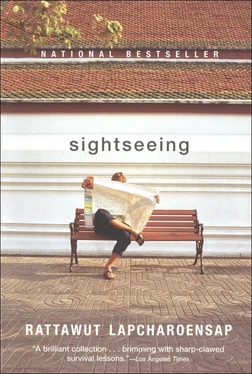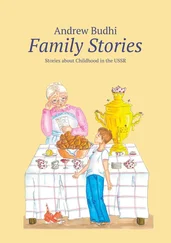“You’re leaving? Where the hell you going, Perry? You can’t even get to your front porch these days.”
“Thailand. Bangkok.”
“That’s a damn shame. I’ll miss you.”
“Yeah.”
“What the hell’s Jack doing over there anyway? He get drafted?”
“Beats me. He’s working in textiles, I think.”
“Perry, you know I fucking hate baseball. It’s a stupid game. Never understood what the big deal was.”
So, naturally, I had my doubts about whether Mac would show up on the appointed day. But he did. He was right on time. He rolled up in his old Volkswagen, got out of the van, and it was a beautiful thing to watch him walk up my front steps in one of his old pinstriped suits. He and Patricia — the black nurse who came by every morning — helped me into the van. “Be careful,” Patricia said before we left. “Don’t get into trouble. You drive real slow, you hear, Mister Johnson?”
As we got on the highway toward Baltimore it seemed like everything might actually be all right. Mac seemed lucid. He was making sense. He nattered on about his own live-in and how much he liked her, how much better she was than the last one, how she was real beautiful and tall, like an African princess, and how irritated she’d gotten that morning when he said she looked like Nefertiti.
“I don’t get it,” he said. “A man can’t even compliment a beautiful woman these days.” Mac’d always had a thing for black women. He’d married two, the last one, Carmen — a real elegant lady with a wonderful smile — having died two years before from cancer in the head. “I didn’t say she looked like Aunt Jemima, you know,” Mac continued. “I’d understand if she got mad about that. All I said was Nefertiti and, wow, slap me silly and call me an asshole.”
I nodded along, pulled the old ballcap snug over my head with my good left hand. But then I realized we’d passed up the exit to Camden Yards.
“Hey,” I said. “There’s Camden Yards, Mac.”
He looked over at me and smiled. That’s when I got real scared.
“We’re not going to Camden Yards, Perry,” he said, laughing. “You know I fucking hate baseball. Never understood what the big deal was.”
“Jesus, Macklin,” I said. “C’mon now. Don’t joke around.”
“What?” he said. “Aren’t we going to Hopkins? Aren’t we going to visit Carmen?”
“No, Mac. Carmen’s dead. We’re going to an Orioles game.”
“Oh,” he said, and now he looked not only confused, he also looked ashamed. “That’s why you’re wearing the ballcap.”
But Mac didn’t turn the car around. We kept on zipping along that highway. “I knew that, you know,” he said. “I knew that about Carmen. You didn’t have to remind me, Perry.”
“Take me home, Macklin.”
“Really?”
“Yes,” I said. “I just want to go home now.”
“You sure?”
“Yeah. Let’s just go rent some videos.”
It took us a while to get back to the house, me directing Mac the whole time thinking I was living my last hour on this earth. Patricia was still at the house cleaning. She came out and helped me get out of the van and into the wheelchair. She didn’t seem the least bit surprised to see us back so soon. She didn’t even ask about the game. I told Mac to come inside. While he sat in the living room, I called his son Tyrone out in Bethesda.
“Jesus,” Tyrone said. “You know he shouldn’t be driving, Mister Perry.”
“No, I didn’t, son,” I said. “I really thought he was all right.”
Tyrone arrived by train a few hours later. When I said good-bye to Mac, he suddenly became lucid again. He bent down and hugged me real hard.
“Hey,” he said. “I’m real sorry about today, Perry. But you come back soon, okay? I’ll make it up to you. The world ain’t seen the last of us yet.”
He climbed into the Volkswagen with his son and that was the last I ever saw of my friend. That’s the last I’ll probably ever see of him. Because I’m lying here now six weeks later in this bed, in this hot, godforsaken, mosquito-infested country, thousands of miles away from ever seeing another Orioles game, with two grandchildren I can barely talk to, a daughter-in-law who mocks my paralysis during mealtimes, and a son who seems indifferent to my plight, all of them sleeping soundly in this house, dreaming their nice little dreams, and I’m so pissed off I’m making a fist in the dark with my good left hand.
Alice would know what to do with the mongrel grandchildren. But Alice isn’t here. Alice is long gone. She never even met these kids sitting across from me now playing a game of gin rummy to help their grandfather pass the time. She never had to deal with the little girl being cute, cheating, spying at my hand through the reflection on my bifocals. Alice never got to slap the girl lightly on the head and say, “Hey. Stop that. Don’t set a bad example for your little brother. We aren’t a cheating people.” She never got to see the girl stare at her uncomprehendingly and then lay down her final trick — four jacks — slamming the rummy card facedown, raising her little cheating fists in victory, sticking out a tongue to taunt her half-paralyzed grandfather while her younger brother laughs with unabashed glee.
“I kick Grandfather ass,” the girl says in English, grinning her cheater’s grin.
“Don’t say that,” I tell her, throwing down my hand in disgust. “Nice girls don’t say ‘ass.’”
“Ass ass ass,” the little boy hisses, giggling hysterically at the sound of his own voice.
“But you teach me,” the girl says. “You teach me ‘ass,’ yes?”
“No, I didn’t. I’d never teach you that.”
“Yes, you did,” she says. “You teach. You say to me one day, ‘Your father Jack is one ass.’”
“Well,” I say. “Even if I did, you shouldn’t say it. Only old men like me get to use that word.”
“Ass ass ass!” the boy continues yapping. He gets up and does a little dance by the table to accompany his refrain. “Shut up,” I tell him. “Sit down, boy.” But he doesn’t listen. He just chants his way to the kitchen to find his mother. “No more play today,” the girl says, getting up from the table to follow her brother. “But maybe tomorrow. Maybe tomorrow Grandfather will win. Maybe tomorrow Grandfather ass will be okay.”
“And maybe tomorrow,” I mutter, watching her skip happily through the doorway to the kitchen, “you’ll stop being such a goddamn cheat.”
When Alice died Jack had been a year in Bangkok. He’d become an executive at some Japanese factory. He was still a bachelor. We rarely heard from him. I think my wife died half-convinced our son was a homosexual. When Jack came back for the funeral and told me he was getting married to a Thai woman, I became belligerent. I told him the news might’ve saved his mother’s life. I didn’t really mean it, of course. I was just sad and angry and scared about Alice dying. I was already starting to miss her pretty bad. But I don’t think Jack has ever forgiven me for saying that. Macklin Johnson told me they never forgive you for saying things like that.
I’ve fallen asleep facedown at the table. They’re waking me up. The wife peels a two of clubs from my cheek and the children laugh. She sits me upright in my chair, clears the cards, sets the table for lunch. “Mister Perry,” she says. “We eat.”
It’s rice and fried egg today. I don’t really want the wife to feed me, but the last time I insisted on feeding myself I’d poured chicken broth down my shirt collar. In due time, with enough exercise and practice, the doctors say, I’ll regain my dignity. They say I’ll be able to use my good left hand just as I’d been able to use my right. But I’ve been lifting that five-pound barbell for weeks now and the hand still shakes like it’s got a life of its own.
Читать дальше











